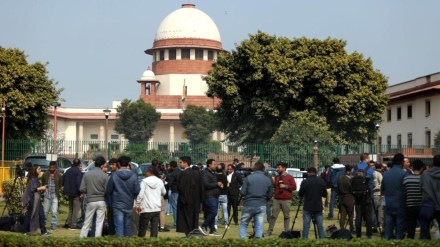The Supreme Court on Wednesday began hearing a batch of petitions challenging the constitutional validity of the recently enacted Waqf (Amendment) Act 2025. Passed by Parliament earlier this month, the amendment has sparked political and legal debate across the country.
During the hearing, CJI said that he was not hearing any arguments on aspect of staying the law. Defending the case for Centre, senior counsel Tushar Mehta said that there was constitution of joint parliamentary committee and elaborate exercise was undertaken. CJI Khanna put options for the advocates. “Either we decide or we relegate you to one High Court or we call pending petitions from High Courts and decide it,” CJI said. S-G Mehta says Centre will file a reply. The top court could take it up in two weeks.
A total of ten petitions have been listed before a bench comprising Chief Justice of India Sanjeev Khanna and Justices Sanjay Kumar and KV Viswanathan. Prominent petitioners include AIMIM chief Asaduddin Owaisi, Aam Aadmi Party (AAP) leader Amanatullah Khan and RJD MP Manoj Kumar Jha. Other petitioners include the Association for the Protection of Civil Rights, Arshad Madani, Samastha Kerala Jamiathul Ulema and several individual citizens. Additional petitions by TMC MP Mahua Moitra and Samajwadi Party leader Zia-ur-Rahman Barq are expected to be listed soon.
The petitioners argue that the amendment infringes upon religious and property rights guaranteed under the Constitution, particularly those of the Muslim community. They have urged the court to examine the law’s impact on the management and autonomy of Waqf properties.
Meanwhile, six BJP-ruled states, Haryana, Maharashtra, Madhya Pradesh, Rajasthan, Chhattisgarh and Assam, have filed applications supporting the constitutional validity of the amended law. These states have emphasized the need for reform in the administration of Waqf properties, with Haryana asserting that mismanagement and lack of transparency necessitated legislative change.
